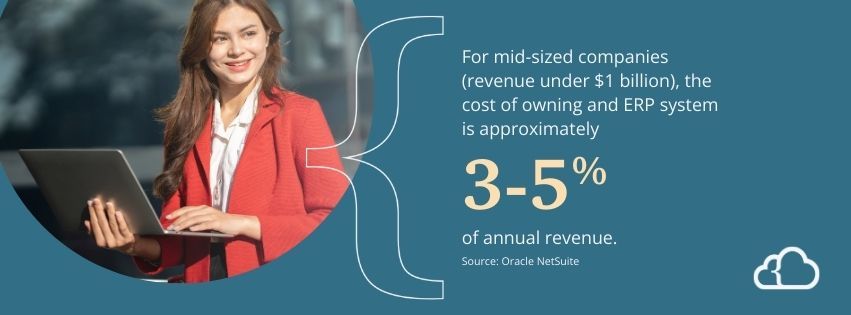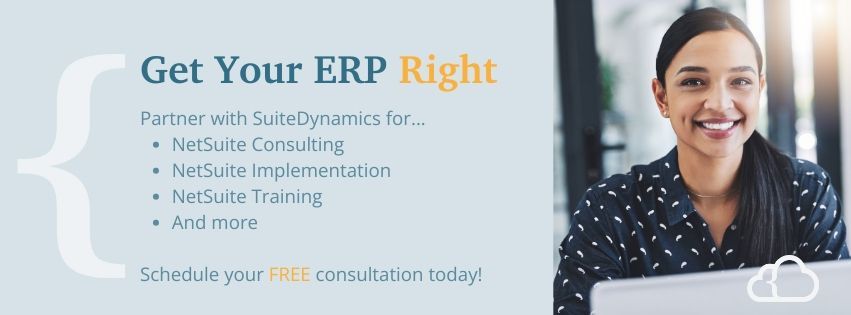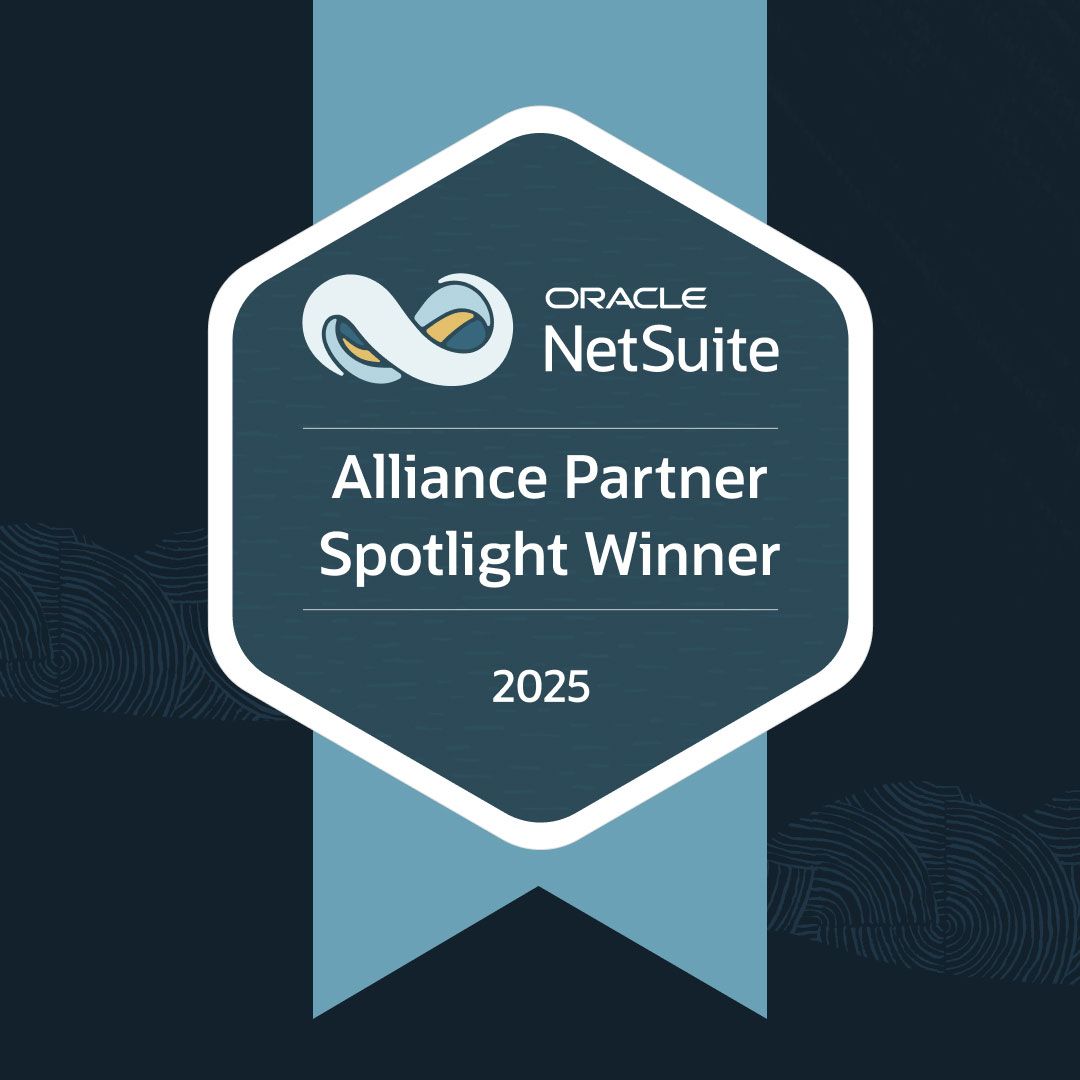The Comprehensive Guide to NetSuite Licenses: Available Types and How to Get One
A NetSuite ERP can streamline your business processes, eliminate data siloes, and spur productivity. But first, you have to purchase some licenses.
The first step in running your company efficiently with a NetSuite Enterprise Resource Planning (ERP) system is to determine what NetSuite licenses you need.
The process can get a bit complicated, so we've compiled a guide that explains every step. Of course, SuiteDynamics experts are always available to answer questions you may have.
Key Takeaways
- Tiered Structure Based on Company Size - NetSuite offers three basic levels based on company size and user needs: Limited Edition (1-10 users for small companies), Mid-Market Edition (11-1,000 users for mid-sized businesses), and Enterprise Edition (1,001+ users for large corporations) – all built on the same code for easy scaling.
- User License Types Determine Access Levels - Companies can purchase two main types of user licenses: Limited-User Licenses for employees who only need to perform minor tasks (expense reporting, documentation, approvals) and Full-User Licenses for staff with established roles requiring regular system access.
- Module-Based Customization Options - Beyond the core functionality, NetSuite allows businesses to license additional modules individually or in industry-specific packages, with the flexibility to add or remove most modules during contract renewal (with NetSuite OneWorld being the exception).
- E-Commerce Solutions Through SuiteCommerce - Businesses with online retail components can choose between SuiteCommerce Standard (for mid-range companies with limited customization needs) and SuiteCommerce Advanced (highly customizable with SEO focus for complex catalogs and high transaction volumes).
- Streamlined Implementation Through SuiteSuccess—Rather than building from scratch, small—to mid-sized businesses can opt for SuiteSuccess. This service offers pre-configured industry-specific solutions with predefined workflows, dashboards, and reports to accelerate implementation while still allowing for customization.
NetSuite Levels
One of the best features of a NetSuite ERP is its Software-as-a-Service (SaaS) delivery method. It’s a cloud-based product, so you don’t have to purchase and maintain expensive servers for your business. Plus, it updates automatically.
The system’s cloud hosting also means that businesses can purchase NetSuite licenses through a subscription process. However, this process isn't as simple as signing up for a monthly magazine.
As a customer, you’ll license a “suite” based on the size of your company and how many users need access. The system has three basic levels. Fortunately, though, they’re all based on the same code, so you can easily switch from one version to another as your business grows.
NetSuite Limited Edition – 1 to 10 Users
This product is built for small companies and startups with up to 50 employees.
NetSuite Mid-Market Edition – 11-1,000 Users
The Mid-Market Edition is, of course, for mid-sized businesses—particularly those with two or more legal entities. It offers modules and functionality not found in the Limited Edition.
NetSuite Enterprise Edition – 1,001+ Users
NetSuite’s largest level is designed for big corporations with multiple legal entities.
NetSuite Service Tiers
NetSuite licenses also correspond to various service tiers. These categories reflect business productivity and feature maximum users, monthly transaction lines, and file storage.
NetSuite Licenses by User
Businesses can also purchase NetSuite licenses based on how much access their employees need. These licenses fall into two main categories.
- Limited-User License – As the name suggests, this license offers limited NetSuite access to a certain number of users. You may opt for this if you have staff who merely need to perform minor tasks, such as expense reporting, documentation, bill approvals, tracking project time, etc.
- Full-User License – Your employees will need this type of license if they have established NetSuite roles and regularly need access to the system. These roles include titles such as accountant, administrator, sales rep, and more. Of course, anyone with a full-user license can access all the system’s modules and features.
NetSuite Licenses by Module
NetSuite ERP software comes with many useful features out of the box. Still, your business may require more functionality, so you can license additional modules to help the system meet your needs.
You can buy these modules individually or in packages designed for your industry. Of course, a NetSuite Solution Partner can further customize the software to better fit your business operations.
Your company can also add and subtract most of these modules as needed. NetSuite OneWorld, however, is the exception, and you should license that software from the start. Also, note that you can only unsubscribe from modules during your contract renewal. So, think carefully about the functionalities you need, and don’t over-commit.
SuiteCommerce License
Businesses with e-commerce components should consider purchasing NetSuite licenses for SuiteCommerce. SuiteCommerce is NetSuite’s native e-commerce platform, seamlessly connecting an online shop’s customer-facing features with its back-office functions. As a customer, you can choose from two main versions of this software.
SuiteCommerce Standard – Designed for mid-range companies, this software includes advanced order management and customer relationship management features. It also allows you to track the customer experience, create marketing campaigns, and personalize the shopping experience.
However, it has a limited capacity for customization.
SuiteCommerce Advanced – This product has all the features included in SuiteCommerce Standard. However, it’s highly customizable and designed with SEO in mind. Businesses prefer it when they must manage high transaction volumes and complex product catalogs or need custom shopping experiences.
SuiteSuccess License
You don’t always have to build an ERP from scratch. Designed for small to mid-size businesses, SuiteSuccess consists of pre-configured industry-specific solutions. It’s made to speed up the implementation process using predefined workflows, dashboards, and reports tailored to specific industries.
This product will quickly get your ERP system up and running while allowing for customization and scalability as your business grows.
| Service Tier | Users | File Storage (GB) | Monthly Transaction Lines |
|---|---|---|---|
| Standard | 100 | 100 | 200,000 |
| Premium | 1,000 | 1,000 | 2,000,000 |
| Enterprise | 2,000 | 2,000 | 10,000,000 |
| Ultimate | 4,000 | 4,000 | 50,000,000 |
NetSuite Licenses by User
Businesses can also purchase NetSuite licenses based on how much access their employees need. These licenses fall into two main categories.
Limited-User License – As the name suggests, this license offers limited NetSuite access to a certain number of users. You may opt for this if you have staff who merely need to perform minor tasks, such as expense reporting, documentation, bill approvals, tracking project time, etc.
Full-User License – Your employees will need this type of license if they have established NetSuite roles and regularly need access to the system. These roles include titles such as accountant, administrator, sales rep, and more. And, of course, anyone with a full-user license can access all the system’s modules and features.
NetSuite Licenses by Module
NetSuite ERP software comes with many useful features out of the box. Yet, your business may require more functionality, so you can license additional modules to help the system meet your needs.
You can buy these modules individually or in packages designed for your industry. Of course, a NetSuite Solution Partner can further customize the software to better fit your business operations.
Your company can also add and subtract most of these modules as needed. NetSuite OneWorld, however, is the exception, and you should license that software from the start. Also, note that you can only unsubscribe from modules during your contract renewal. So, think carefully about the functionalities you need, and don’t over-commit.
SuiteCommerce License
Businesses with e-commerce components should consider purchasing NetSuite licenses for SuiteCommerce. SuiteCommerce is NetSuite’s native e-commerce platform, seamlessly connecting an online shop’s customer-facing features with its back-office functions. As a customer, you can choose from two main versions of this software.
SuiteCommerce Standard – Designed for mid-range companies, this software includes advanced order management and customer relationship management features. It also allows you to track the customer experience, create marketing campaigns, and personalize the shopping experience.
However, it has a limited capacity for customization.
SuiteCommerce Advanced – This product has all the features included in SuiteCommerce Standard. However, it’s highly customizable and designed with SEO in mind. Businesses prefer it when they must manage high transaction volumes and complex product catalogs or need custom shopping experiences.
SuiteSuccess License
You don’t always have to build an ERP from scratch. Designed for small to mid-size businesses, SuiteSuccess consists of pre-configured industry-specific solutions. It’s made to speed up the implementation process using predefined workflows, dashboards, and reports tailored to specific industries.
This product will quickly get your ERP system up and running while allowing for customization and scalability as your business grows.
The Process of Obtaining a NetSuite License
NetSuite ERPs have complicated set-up processes. So, naturally, subscribing to them involves more than payments and button clicks. In fact, it takes three steps to purchase NetSuite licenses.
Step 1: Introduction
Businesses begin the licensing process by choosing who they want to work with since you can purchase a NetSuite license either through the Oracle NetSuite company or one of its solution partners.
Before purchasing, you’ll meet with your chosen provider to discuss your business needs and how the system can meet them. Essentially, you’ll get introduced to the NetSuite system.
Your provider will then lead you through a “value chain assessment,” which examines every area of your business, such as sales, billing, financial management, procurement, human resources, inventory, warehouse management, etc. This step also includes a demo illustrating the functionality of each module.
You can also consider the option of implementing the financial module first. NetSuite’s Financials First edition allows you to start with that single module and add other modules as needed.
Step 2: Quote
If you’re still interested in moving forward after the demo, you’ll work with your provider to finalize the NetSuite version and modules you need. Once you determine the type and scope of your system, your chosen provider can offer quotes for NetSuite licenses and implementation.
Step 3: Close
After the quote and demo, all that's left to complete is the paperwork. During this final step, your partner will work with you to craft blueprints for the implementation, finalize your NetSuite proposal, and organize a statement of work.
Most businesses are ready to purchase NetSuite licenses after signing their contracts. At that point, they receive their software accounts.
But, if you're working with SuiteDynamics, your NetSuite partnership may be just beginning. Our team will start the implementation process, configuring the system exactly as specified. We also offer Managed Services packages that help maintain your system, train your staff, adjust the software for expansion, and more.
We believe our job is not just to customize and implement NetSuite but to help companies like yours operate the custom systems they need to thrive.
Blow Away the Competition
Stop fighting a software system that's working against you. Instead, enjoy the benefits of an ERP that knits your operations together seamlessly and provides the data and analysis you need to trounce your competition.
We know you can rise in your industry.
So, team up with SuiteDynamics to develop the ERP system your business needs. As NetSuite solution providers, we customize and implement NetSuite ERP software for clients in any industry.
And the partnership doesn't stop there. We can work with you long after go-live, maintaining the system, training staff, and adjusting the software to accommodate your expansion. So, start by contacting us for your free NetSuite demo.
Shasta Hague is a SuiteDynamics Delivery Manager with over a decade of NetSuite expertise and more than 5 years in consulting. Her career began in accounting, where she rose from accounting clerk to CFO before transitioning to a Lead Financial Consultant and, ultimately, advancing to her current leadership role. She holds numerous NetSuite certifications—including Suite Foundations, NetSuite Administrator, Financial User, Advanced Revenue Management, and Multi-Book—and an MBA with an emphasis in accounting from Grand Canyon University. Currently, Shasta resides in Tennessee with her husband and two of her four children.
We pull information from NetSuite material, SuiteDynamics experts, and other reliable sources to compose our blog posts and educational pieces. We ensure they are as accurate as possible at the time of writing. However, software evolves quickly, and although we work to maintain these posts, some details may fall out of date. Contact SuiteDynamics experts for the latest information on NetSuite ERP systems.
Disclosure: This article was developed with the assistance of Claude, an AI created by Anthropic. Our editorial team used Claude as a collaborative writing tool, carefully reviewing, editing, and fact-checking all AI-generated content. The final text has been thoroughly vetted to ensure accuracy, clarity, and alignment with SuiteDynamics' editorial standards. We take full responsibility for the content presented in this article, maintaining our commitment to providing reliable and informative insights to our readers.













